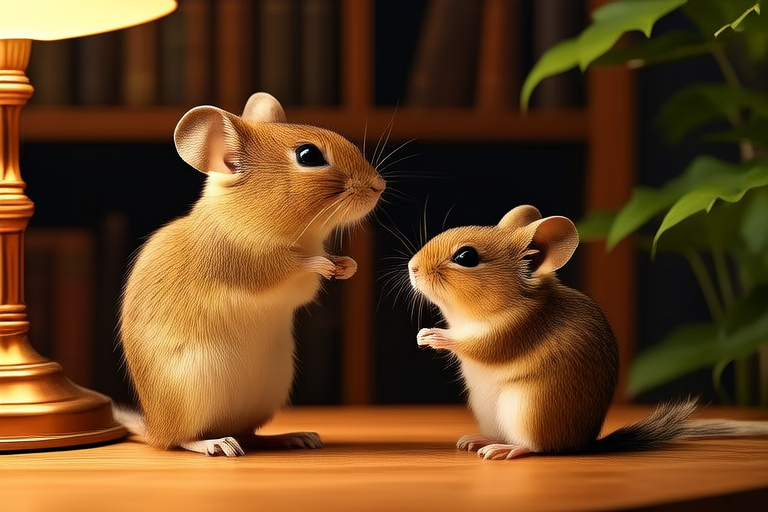The Curious Case of Chinchillas: Why These Tiny Creatures Deserve a Big Space in Your Heart
Welcome to the enchanting world of chinchillas! These small, fluffy creatures have captured the hearts of many animal lovers with their unique behaviors, adorable appearances, and specific care requirements. If you’re considering adopting a pet that is both fascinating and delightful, then perhaps it’s time to give these curious creatures a closer look. In this article, we will explore the origins of chinchillas, their social nature, grooming habits, and the importance of providing them with ample space and stimulation for their well-being.
Origins and History
Chinchillas hail from the Andes Mountains of South America, where they have thrived in harsh, rocky terrains for thousands of years. Their natural habitat includes areas with cool temperatures and high altitudes, making them well-adapted to living in environments similar to those found in their native lands. Despite their wild roots, chinchillas have become increasingly popular as pets due to their gentle demeanor and striking appearance. Historically, chinchillas were hunted for their luxurious fur, which led to a significant decline in their population. Thankfully, conservation efforts have helped protect these animals in their natural habitats, allowing us to enjoy them as cherished companions.
Social Nature and Bonding
Chinchillas are naturally social animals, often living in large colonies in the wild. This means that they thrive on interaction and companionship, making them excellent candidates for those who are willing to invest time and effort into building a strong bond with their pet. Studies have shown that chinchillas form deep emotional connections with their owners, especially when provided with consistent care and attention. One anecdote from a long-time chinchilla owner describes how her chinchilla would greet her at the door every evening, nuzzling her hand affectionately. This behavior is not uncommon among chinchillas, as they tend to recognize and respond positively to familiar faces.
Grooming Habits
One of the most remarkable aspects of chinchillas is their exceptional grooming habits. These animals spend a considerable amount of time cleaning themselves and each other, using dust baths to maintain their soft, dense coats. Unlike other animals that rely on water to clean themselves, chinchillas prefer dry dust baths made from special chinchilla dust. This unique grooming method helps prevent oil buildup and keeps their fur healthy and shiny. Providing your chinchilla with regular access to dust baths is essential for maintaining their overall health and well-being. Additionally, chinchillas are meticulous groomers, spending hours each day ensuring their fur is free from dirt and debris.
Specific Care Needs
While chinchillas are relatively low-maintenance pets compared to some other species, they do require specific care to ensure their happiness and longevity. Proper housing is crucial for chinchillas, as they need plenty of room to move around and explore. A spacious cage equipped with multiple levels and tunnels provides ample opportunities for exercise and mental stimulation. Chinchillas also benefit from having toys and activities that keep them engaged, such as chew toys, puzzle feeders, and interactive games. Regular veterinary check-ups are important to monitor their health and address any potential issues early on.
Feeding your chinchilla a balanced diet is another key aspect of their care. Their diet should consist primarily of hay, supplemented with fresh vegetables and pellets formulated specifically for chinchillas. It’s important to avoid feeding them foods that could be harmful, such as fruits, sugary treats, or items containing caffeine. Providing fresh water daily is also essential for their hydration and overall health.
The Importance of Space and Stimulation
Chinchillas are highly active and intelligent animals that require ample space and mental stimulation to thrive. In the wild, they spend much of their time exploring, foraging, and interacting with their environment. As pets, they need similar opportunities to engage in enriching activities that challenge their minds and bodies. Providing a variety of toys, puzzles, and hiding spots within their enclosure can help satisfy their natural curiosity and prevent boredom. Additionally, allowing your chinchilla supervised time outside of their cage each day gives them the chance to explore and exercise in a safe environment.
One study conducted by a group of veterinarians found that chinchillas housed in larger enclosures with more enrichment options exhibited lower stress levels and better overall health compared to those kept in smaller, less stimulating environments. This research underscores the importance of creating a space that encourages physical activity and mental engagement for your chinchilla.
Adopting a Chinchilla
If you’re considering adopting a chinchilla, it’s important to do your research and ensure that you’re prepared for the commitment involved in caring for one of these wonderful creatures. Many shelters and rescue organizations offer chinchillas up for adoption, providing an opportunity to give a loving home to an animal in need. Adopting a chinchilla not only benefits the animal but also supports the work of organizations dedicated to rescuing and rehoming pets.
When adopting a chinchilla, it’s important to ask questions and gather information about the animal’s history, health, and behavior. This will help you make an informed decision and ensure that you’re ready to provide the best possible care for your new furry friend. Additionally, many shelters and rescue groups offer resources and guidance to help new owners adjust to life with a chinchilla, making the transition smoother for both you and your pet.
Conclusion
The curious case of chinchillas is one filled with wonder and delight. From their origins in the Andes Mountains to their unique grooming habits and social nature, these tiny creatures have much to offer those who are willing to appreciate them. By understanding their specific care needs and providing them with ample space and stimulation, you can ensure that your chinchilla leads a happy and healthy life. Whether you’re considering adopting a chinchilla or simply looking to learn more about these fascinating animals, take the time to get to know chinchillas better. They just might earn a big place in your heart.
